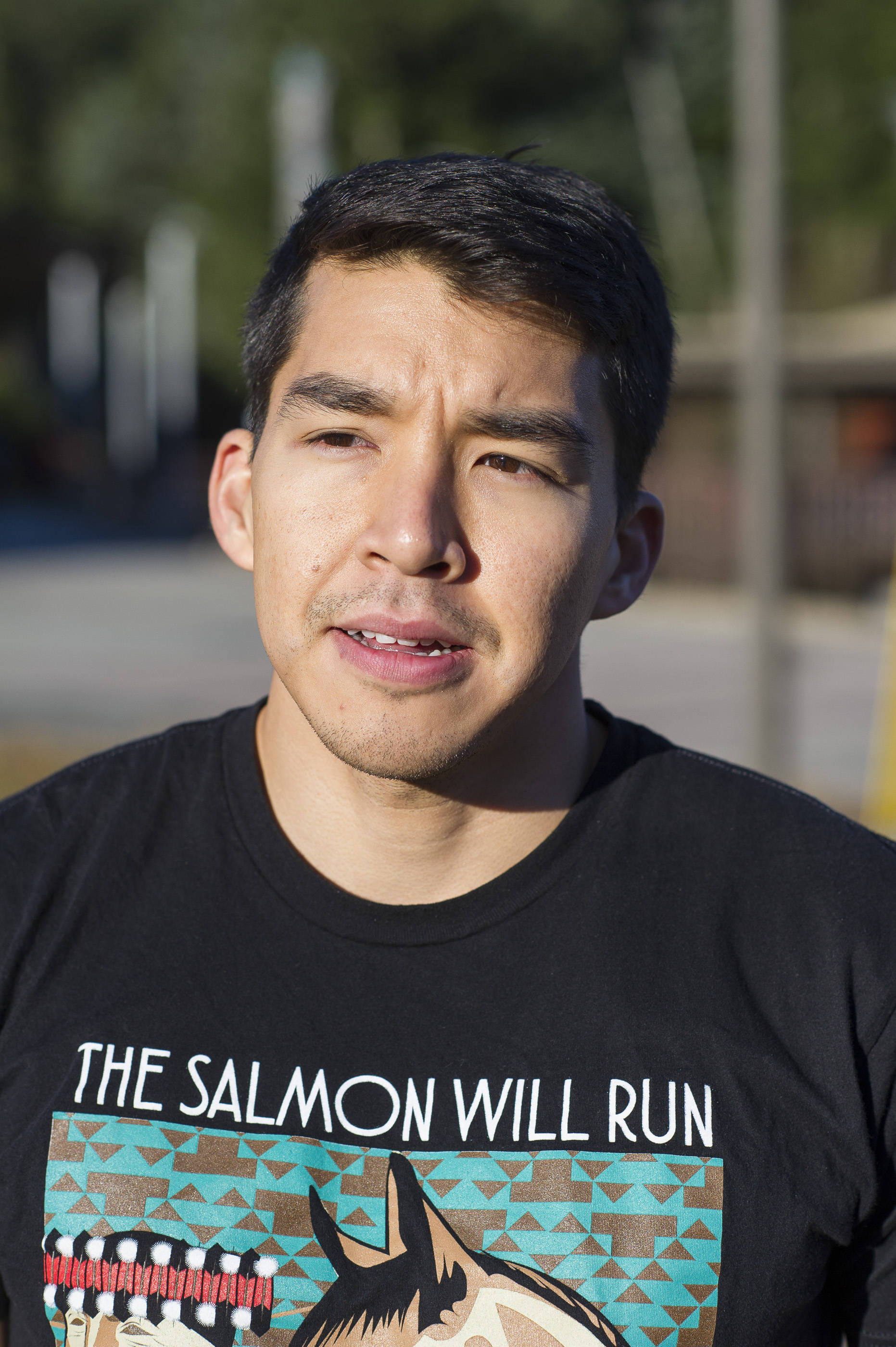His body curled like a pretzel, Kyle Worl focused his eyes on a ball dangling from a string more than 6 feet in the air. He prepared to execute an Alaskan high kick, one of 10 events at the Native Youth Olympics, by balancing on one foot and one hand, his planted hand behind him and his backside just a few inches off the ground.
Balanced just so, he pushed hard off his right foot while holding his left foot in his hand, lifted his hips above his head and kicked the ball with his right foot.
The move can best be described as a one-handed handstand with a kick at the top. Only, Worl held his left foot with his right hand the entire time. The Alaskan high kick took him more than four years to master.
Doing it well is called “going vertical” Worl explained.
“I don’t think I’ve known anyone who’s gone vertical in the first year (of trying),” Worl said during a Tuesday demonstration at the University of Alaska Southeast.
Worl will teach this balancing act, and other skills, to Juneau youth. Juneau hasn’t had a Native Youth Olympics team for almost 30 years. Thanks to a sponsorship from the Sealaska Heritage Institute, the Juneau School District’s Indian Studies program and the University of Alaska Southeast Wooch Een club, that will change: Starting Nov. 13, Juneau School District students will be able to join a Native Youth Olympics team and work with Worl.
The students will prepare for the 2018 Native Youth Olympics Senior Games on April 26-28 at the Alaska Airlines Center in Anchorage. Worl hopes to send a team from each high school up, though plans for a travel team are still in the works. About 500 athletes from over 100 communities attend the event, but only one comes from Southeast Alaska, a team representing Mt. Edgecumbe High School in Sitka.
“It’s unfortunate. Juneau hasn’t sent a team, I think my uncle said, since 1989,” Worl said.
A 26-year-old who grew up in Fairbanks, Anchorage and Juneau, Worl is a highly-decorated athlete. He won eight medals at the 2017 World Eskimo-Indian Olympics in Fairbanks, including three gold and the Howard Rock Outstanding Athlete Award. In 2016, he took home 10 medals at the WEIO. He also competes in the Arctic Winter Games, where last year he reached the podium in two events, the two-foot high kick and the knuckle hop.
But competing, he said, is about much more than medals and awards. Like other youth sports, it’s about finding a positive outlet, setting goals and meeting them. But with NYO, Alaska Native values are baked into the competition.
Surviving in some of the world’s harshest conditions required teamwork and self-discipline.
“We had to coordinate together in order to hunt, to gather, to fish,” Worl explained. At the games, athletes often give advice to one another and cheer each other on. There’s no gloating. No trash talk.
“It’s not about outkicking each other or going the farthest. It’s about doing your own personal best. It’s a competition with yourself,” Worl said. “It’s a good reflection of who our people are.”
Worl credits Alaska Native sports with helping “set him on the right path” when he started practicing at 17. Competition gave him a motivation to live a healthy lifestyle, engage with his community and work hard.
Worl started his coaching career last year at Service High School in Anchorage, where he saw “all those same benefits in the students.”
Worl’s father holds the world record in the knuckle hop, a grueling variation on an NYO event called the seal hop. Competitors must “hop” in a pushup position on their knuckles and toes without straightening their arms or letting their body touch the floor. (The seal hop uses the hand’s heels instead of the knuckles).
The competition is judged by distance. Worl placed second last year in the knuckle hop at the Arctic Winter Games, hopping 143 feet, 1 inch. His father’s record: 191 feet, 10 inches, set at the 1988 Arctic Winter Games.
“It’s a pure endurance game and it’s all about not trying to burn out too soon. I train by doing as many pushups at once,” Worl said. “And also pain, but in competition, it kind of just goes numb with all the adrenaline.”
Students on Worl’s teams won’t learn the knuckle hop yet: that’s an event reserved for adult competitions at the WEIO and the AWG. In addition to the Alaskan high kick, Worl will prepare his athletes for: the Eskimo stick pull, indian stick pull, kneel jump, one-foot high kick, one-hand reach, scissor broad jump, seal hop, two-foot high kick and wrist carry.
At Juneau-Douglas High School, practices for Juneau’s Native Youth Olympics team will be held during lunch every Monday from Nov. 13-Dec. 11 at the auxiliary gym and from 4-5:30 p.m. every Wednesday from Nov. 15-Dec. 13 in the commons.
At Thunder Mountain High School, practices will be held during lunch every Friday on Nov. 17, Dec. 1 and Dec. 8 and from 4-5:30 pm every Monday from Nov. 13-Dec. 11 at the Purple Wing commons.
For more information about Native Youth Olympics practice, contact Worl at kyle.worl@gmail.com or (907) 227-4998.
• Contact reporter Kevin Gullufsen at 523-2228 or kevin.gullufsen@juneauempire.com.

